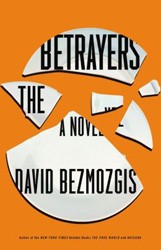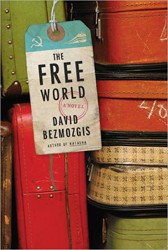The lively literary invasion from Eastern Europe continues with the arrival of Natasha, the debut short-story collection of Latvian-born David Bezmozgis.
In these sad, funny, tender tales we meet three generations of the Berman family: Mark, the common narrator of the stories, his parents, Bella and Roman, and his grandparents, who have fled Riga for a better life in the Russian-Jewish enclaves of Toronto.
The collection opens with “Tapka,” which details the family’s early, awkward struggles with their new language, in particular the horrendous consequences to them and their neighbors, of six-year-old Mark’s misapplied language skills.
Bezmozgis, who now lives in Toronto, moves us along through the vagaries of assimilation and coming-of-age, often hilarious, occasionally humiliating, to “Minyan,” the last of the seven stories.
Mark’s beloved, checkers-playing grandfather has moved into an old-age home and as he and Mark navigate the new community’s jealous and narrow-minded culture, Mark is surprised to find himself drawn back into the solace of the religion he has taken for granted.
Throughout, the scenes are finely observed, rich in sensory detail. In the opening lines of “Topka,” Bezmozgis considers three separate tenement buildings: “Goldfinch was flapping clotheslines, a tenement delirious with striving. 6030 Bathurst: insomniac scheming Odessa. Cedarcroft: reeking borscht in the hallways.” From “Roman Berman, Massage Therapist”: “My father was dressed in his blue Hungarian suit — veteran of international weightlifting competitions from Tallinn to Sochi. I had been put into a pair of gray trousers and a pressed white cotton shirt, with a silver Star of David on a silver chain not under but over the shirt. My mother wore a green wool dress that went nicely with her amber necklace.… With feigned confidence we strode up Kornblum’s nicely trimmed walk: three refugees and a warm apple cake.”
Shadows of Philip Roth, Isaac Babel and Leonard Michaels may hover beneficently in the wings but it is Bezmozgis’s pure, quirky humanity that shines in this deeply original debut collection.

Fiction
Natasha: And Other Stories
By
– October 26, 2011
Judith Felsenfeld book of short fiction, Blaustein’s Kiss, was published in April, 2014. Her stories have appeared in numerous magazines and literary reviews, including The Chicago Review, The Southwest Review, Blue Mesa, and broadcast nationwide on NPR’s Selected Shorts.
Discussion Questions
From Picador
1. In “Tapka” what does the dog symbolize to Rita? To Mark’s mother? What is the significance of the dog to Mark, initially as a young boy and then as a mature narrator? On page 9, Mark observes, “we had intuited an elemental truth: love needs no leash.” Do you agree? How does his observation relate to the events in “Tapka”? Does the story end happily or tragically? Explain.
2. Despite being set in Canada, do you think the struggles faced by the Bermans in “Roman Berman, Massage Therapist” might apply to other immigrants elsewhere in the world, particularly America? Explain. Why is Doctor Kornblum interested in the Bermans? When the family leaves the Kornblums, Mark wonders, “As we walked back to the Pontiac it was unclear whether nothing or everything had changed” (p 36). Do you think anything changed? Explain.
3. In what ways is “The Second Strongest Man” a continuation of the themes introduced in “Roman Berman, Massage Therapist”? Does the second story resolve some of the questions posed in the earlier story? Explain. Why is Roman’s confession to Gregory on page 60, stating that he often thinks of returning to Russia, a significant moment in the story? By the end, how do you think Mark views his father’s situation versus that of Gregory?
4. How is the story “An Animal To The Memory” about both the rejection and acceptance of one’s cultural identity? What conflicting messages does Mark receive about his heritage? On page 69, Mark’s mother says that he is not leaving Hebrew school until he learns what it is to be a Jew. Does Gurvich finally teach Mark what it means to be a Jew? How?
5. In the title story, how does Bezmozgis gradually reveal that Natasha is not like other girls that Mark has met? How do Mark, Natasha and Zina each view sex differently? On page 94, do you think that Mark and Natasha’s discussion about sexuality objectification reveals anything about men’s and women’s attitude toward sex in general? Why? On page 104, Natasha accuses Mark of being like his uncle, of wanting people to make his decisions for him. Do you agree? Explain. By the story’s end, what has Natasha taught Mark about himself?
6. In “Choynski,” how do the events leading to the deaths of Mark’s grandmother and Charley Davis mirror each other? How does the story’s narrative structure contribute to this mirroring effect? What do Joe Choynski and the theme of fighting symbolize in the story as a whole? Why do you think it’s so important that Mark return his grandmother’s false teeth to her? What does the story seem to be saying about the importance of the things that people leave behind after they die?
7. In “Minyan,” why does Bezmozgis never define the exact nature of Itzik and Herschel’s relationship? Do you think that defining it would change the story’s meaning? Explain. According to Zalman, what will happen to Herschel? Do you think that “Minyan” is a fitting end to Natasha? Why?
8. Do you think that reading Natasha’s stories together, in the order they are arranged, offers a different experience than if you were to read the stories independently in a magazine? Why? In what ways is Natasha more like a novel than other story collections you may have read?
9. Do you think that being Jewish or a Russian immigrant alters how you read the stories in Natasha? In what ways do the stories transcend the specificity of their characters’ experience and become universal? Which stories and characters in Natasha did you most relate to? Explain

Jewish literature inspires, enriches, and educates the community.
Help support the Jewish Book Council.



